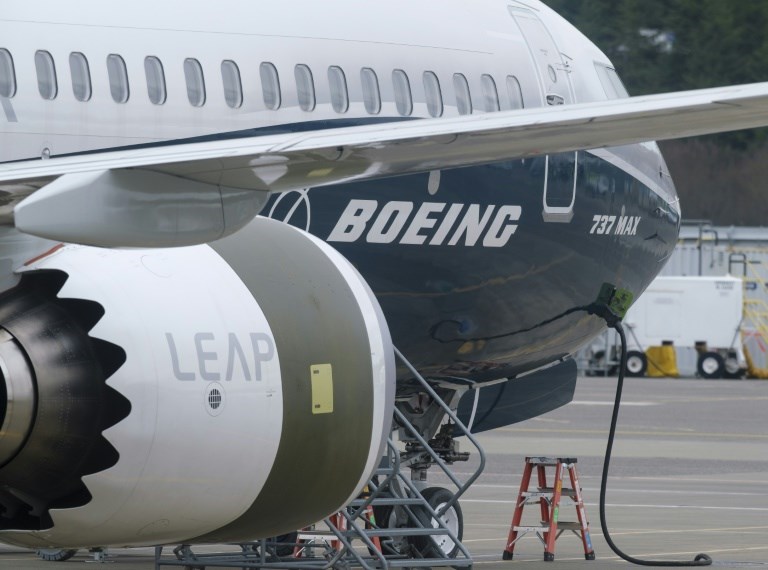US aviation authorities will defend their certification methods for new planes before lawmakers Wednesday, two weeks after grounding the Boeing 737 MAX over two deadly crashes in less than five months.
Boeing has flown test flights of its 737 MAX to evaluate a fix for the system targeted as a potential cause of the crashes, two sources familiar with the matter said Tuesday.
The aviation giant, which has been under fire and has seen its flagship narrow-body planes grounded since March 13, tested the system upgrade on Monday, two days after pilots from American and Southwest Airlines did simulation flights in Renton, Washington, the sources said.
Boeing needs authorization from the Federal Aviation Administration (FAA) before the MAX can return to service. But the company still has not submitted its proposed software patch to the FAA, a government source told AFP.
The aircraft was grounded following two deadly accidents involving Ethiopian Airlines earlier this month and Lion Air in October that together killed 346 people.
A Senate Commerce Committee panel will hold a hearing Wednesday to question FAA Acting Administration Daniel Elwell and Transportation Department Inspector General Calvin Scovel.
The session is set to be followed by a second hearing at a later date with Boeing, airline pilots and other stakeholders.
The officials are expected to face questions from lawmakers on the FAA's certification of the 737 MAX -- and whether regulators have become too cozy with the company and fast-tracked some approvals.
Engineers have been focusing on problems with the Maneuvering Characteristics Augmentation System (MCAS), a stall prevention system designed to point the nose of the 737 MAX 8 downward if it is in danger of stalling, or losing lift.
The system has been criticized since it can malfunction and make it difficult for pilots to control the aircraft. Both of the recent crashes occurred moments after takeoff.
- FAA to face Congress -
Boeing said it will be "carefully monitoring" the aviation officials' testimony, adding that "safety is our top priority."
The FAA was "directly involved in the system safety review of the Maneuvering Characteristics Augmentation System (MCAS)," Elwell will tell lawmakers, according to prepared remarks seen by AFP.
"FAA engineers and flight test pilots were involved in the MCAS operational evaluation flight test," the remarks read.
"The certification process was detailed and thorough, but, as is the case with newly certified products, time yields more data to be applied for continued analysis and improvement."
However, Elwell is set to acknowledge that with increasingly complex systems, "our oversight approach needs to evolve to ensure that the FAA remains the global leader in achieving aviation safety."
The FAA is expected to defend its practices, including the delegation of key testing and certification to Boeing in light of tight government budgets, said Scott Hamilton, an aviation expert with Leeham Company.
Lawmakers could push the FAA to pledge rigorous oversight before allowing the 737 MAX to return to service.
Elwell was set to concur, saying authorities will only allow the aircraft to fly again "when the FAA's analysis of the facts and technical data indicate that it is appropriate."
- Flights when 'appropriate' -
Preliminary results in the investigation into October's Lion Air crash in Indonesia indicate a single "angle of attack" sensor, which feeds data to the MCAS, malfunctioned but continued transmitting data to the plane's flight systems, including the MCAS.
Among the changes to the system, the MCAS would automatically be disabled in cases where there is disagreement between two sensors, the sources told AFP.
Boeing also intends to make standard on planes a "disagree light," to signal when the MCAS malfunctions. The feature currently is only available to airlines for an additional charge.
"Frankly, I think Congress itself should be testifying on its decades of underfunding the FAA to do its job of overseeing the aerospace industry (as well as modernizing Air Traffic Control)," said Hamilton. "But it won't take this responsibility."
Scovel likely will be asked what he has learned so far in the Transportation Department's investigation into the FAA certification of the 737 MAX, which was requested by Transportation Secretary Elaine Chao.
Chao sought the audit to develop "an objective and detailed factual history" of the process of certifying the aircraft," she said in a memo to Scovel last week.
The MCAS was installed in the MAX because the engines are heavier than in the previous version of the 737.



